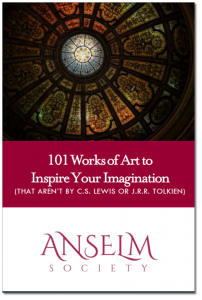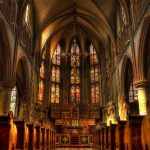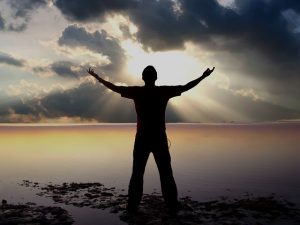EPISODE SUMMARY:
Our topic of Season 4 of the Eudo podcast is “Re-discovering the Sacramental Image.” We want to see the world and delight in it the same way Jesus does, and we want to join with God to re-enchant the world and then invite others to do the same. However, this all begins by cultivating wonder. So, in the first episode of season 4, Dr. Paul M. Gould explores the nature and role of wonder in the human life.
EPISODE NOTES:
Why is wonder so important to the human life?
Wonder is a “prerequisite of authentic humanness” [1]. Without wonder, along with other basic attitudes—courage, hope, trust, love—man cannot discover his authentic self. As Sam Keen bluntly puts the modern predicament: “If man is to survive as man, he must never cease wondering” [2].
Why is wonder necessary for human survival?
Wonder is an invitation to embark on a journey to understand the awe, fear, delight, and mystery within the world; to know in a participatory way the object of wonder, and in the process to discover the meaning of the world and our place within it.
What is Wonder?
The experience of wonder is a potent mix of emotion, desire, encounter, and invitation.
- First, the experience of wonder is an emotional response—of awe, dread, curiosity, perplexity, bewilderment, and love—toward some object or event.
- Second, wonder is a natural desire, a deep desire of the human heart to experience the world as loving and delightful.
- Third, wonder is a kind of personal encounter with the object of wonder (a kind of I-Thou encounter).
- Finally, wonder is an invitation. Wonder spurs us on to move from awe and perplexity to curiosity and finally a quest for explanation: wonder propels us on to seek order and meaning in a world full of delight.
Kinds of Wonder:
In a classic book on wonder, Sam Keen notes two basic kinds of wonder. First, there is what he calls “ontological wonder” – this is not a kind of wonder evoked by some particular object, but a kind of wonder that there is anything at all. Second, there is “mundane wonder” – this wonder “is elicited by what a thing is rather than that it is” [3]
The Function of Wonder
Wonder helps us on our journey of discover to find our authentic self. What begins in wonder and delight sets us on a quest to make sense of our world.
Wonder and the Holy
Sam Keen observes, in wonder “something gives itself to us” [4]. Even the word we use to describe the raw material of our sensory perception points to the reality that the world is given, or gifted, to us: “Datum” means, “what is given.” Thus, “in wonder we are presented with a gift of meaning” [5]. We begin to see the world as it really is. As Sam Keen provocatively explains our experience of wonder as kind of sacramental perception: traditionally, wonder “is the attitude that marks man’s awareness that he is in the presence of the holy” [6]. This connection between wonder and God is seen throughout Scripture also.
Wonder is Uniquely Human
Man has been described as Homo admirans – “wondering man.” As Sam Keen observes, traditionally, “[Man] accepted his life and his environment as a meaningful gift which filled him with admiration and gratitude and responded actively by creating a community in harmony with patterns of meaning and value which he believed were homogenized into the cosmos” [7]. We are born with the deep desire for wonder.
CONCLUDING REMARKS:
How can we cultivate wonder in our lives? Look and see. Ask the question, “Why?” Take time to look around (look up too). Expose yourself to objects of wonder including beauty (in art, nature, story, etc.).
For a the free e-book from our season 4 sponsor, click this link: “101 Works of Art to Inspire Your Imagination (That Aren’t by C. S. Lewis or J. R. R. Tolkien)”


RESOURCES MENTIONED:
- Brown, William P. Sacred Sense. Grand Rapids, MI: Eerdmans, 2015.
- Keen, Sam. Apology for Wonder. New York, NY: Harper Torchbooks, 1969.
- Konner, Melvin. The Tangled Wing: Biological Constraints on the Human Spirit. New York, NY: Henry Hold, 2002.
[1] Keen, Apology for Wonder, 17.
[2] Ibid.
[3] Ibid., 22–24.
[4] Ibid., 27.
[5] Ibid.
[6] Ibid., 62.
[7] Ibid., 61.





